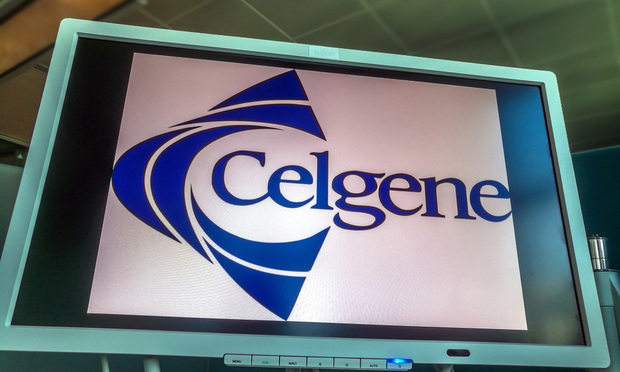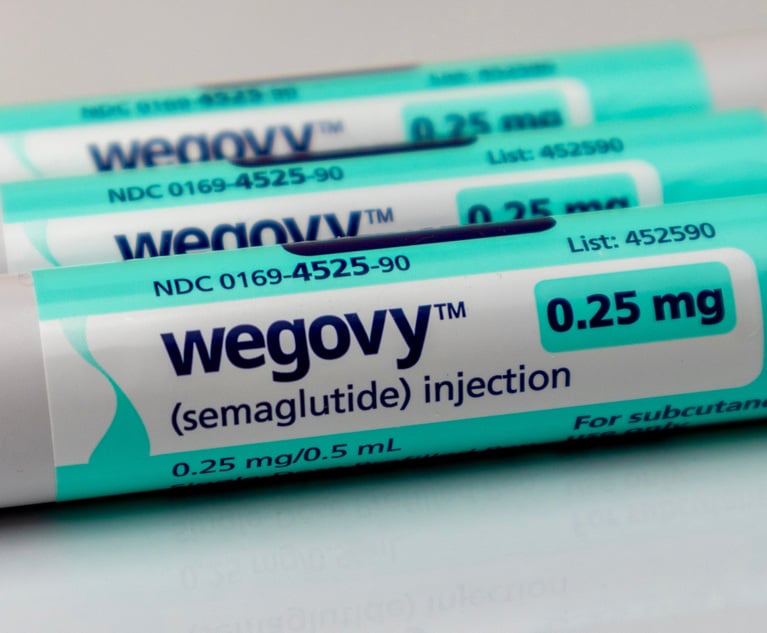Celgene Agrees to $55M Settlement in Price-Fixing Litigation
The drugmaker was accused of antitrust violations for allegedly interfering with development of generic versions of two of its drugs.
July 25, 2019 at 03:46 PM
4 minute read
The original version of this story was published on New Jersey Law Journal
 Celgene logo on computer screen. Courtesy photo.
Celgene logo on computer screen. Courtesy photo.
Drugmaker Celgene has agreed to pay $55 million to settle a class action lawsuit accusing it of violating antitrust laws by interfering with the development of generic versions of two of its cancer drugs.
Plaintiffs in the class action, a group of labor unions and other end payers, moved Wednesday for preliminary approval of the settlement. The suit claimed Celgene repeatedly hiked the prices of its drugs Thalomid and Revlimid while pursuing an anti-competitive scheme against at least 11 makers of generic drugs. The settlement was reached after negotiations with mediator Jed Melnick of JAMS in New York.
Celgene charges up to $500 per capsule for the drugs, and has taken in $17.1 billion selling them from 2009 to 2013, the suit claimed.
Celgene, based in Summit, is in the midst of a deal to be acquired by Bristol-Myers Squibb. The acquisition prompted a suit in Delaware Chancery Court last March by a Celgene investor who claimed the deal undervalued the company and its cancer therapies that are in the development pipeline. The stockholder class action suit claimed that Bristol-Myers was “taking advantage” of a temporary decline in Celgene’s stock price to offer investors an estimated $102 in total value for each share they own in Celgene. Bristol-Myers’ headquarters are in New York City.
Celgene refuses to sell its product, citing an FDA-mandated distribution program called Risk Evaluation and Mitigation Strategies (REMS), which requires pharmacists and patients to enroll in the program before receiving the drugs.
Thalomid is also known as thalidomide, which was developed in the 1950s as a treatment for morning sickness in pregnant women, but it was taken off the U.S. market in 1962 after it was found to cause severe birth defects. It was approved in 1998 as a treatment for leprosy, and more recently was used in conjunction with steroids to treat multiple myeloma. Revlimid is similar to Thalomid and is also used for myeloma. Approval in 1998 was contingent on participation in the REMS program to ensure pregnant women do not use the drugs.
The Thalomid and Revlimid litigation claimed Celgene violated the Clayton Act and Sherman Act, and raised various antitrust, unfair trade practices and unjust enrichment claims under the laws of several states. Plaintiffs alleged that Celgene listed in the Orange Book and sued to enforce patents that were invalid, refused to sell samples of Thalomid and Revlimid to permit development of generics, encouraged the Food and Drug Administration to reject generics’ applications based on sham safety concerns, and entered into anti-competitive settlement agreements with generic manufacturers. Generic equivalents of Thalomid and Revlimid were delayed for years due to the conduct of Celgene, the suit claimed.
The settlement class consists of people or entitles who paid the purchase price of Thalomid or Revlimid in California, the District of Columbia, Florida, Kansas, Maine, Massachusetts, Michigan, Nebraska, New York, North Carolina, Oregon, Pennsylvania, Rhode Island or Tennessee, for consumption by themselves, their families, or their members, employees, insureds, participants or beneficiaries.
Class counsel for the plaintiffs were the firms of Hausfeld; Block & Leviton; and Hach Rose Schirripa & Cheverie.
Hausfeld partner Melinda Coolidge, who worked on the case, said in a statement, “Cancer patients shouldn’t have to worry about the rising cost of their life-saving medications. We are very pleased to have achieved such a sizable settlement on behalf of those who have shouldered the cost of these drugs.”
Hausfeld said in its statement that the settlement is “one of the largest pharmaceutical settlements on behalf of end payers (consumers, insurers, union health and welfare funds, municipalities, and others) in an antitrust case in the last decade.”
Whitney Street, a Block & Leviton partner who worked on the case, said in a statement, “We are pleased to have obtained a substantial recovery on behalf of cancer patients and other parties that bear the skyrocketing cost of these lifesaving drugs.”
Lawyers at Williams & Connolly and Lowenstein Sandler who represented Celgene did not respond to requests for comment.
This content has been archived. It is available through our partners, LexisNexis® and Bloomberg Law.
To view this content, please continue to their sites.
Not a Lexis Subscriber?
Subscribe Now
Not a Bloomberg Law Subscriber?
Subscribe Now
NOT FOR REPRINT
© 2025 ALM Global, LLC, All Rights Reserved. Request academic re-use from www.copyright.com. All other uses, submit a request to [email protected]. For more information visit Asset & Logo Licensing.
You Might Like
View All
Wilson Sonsini Knocks Out Claims Against Inhibrx Biosciences in Trade Secrets Verdict


Chancery Again Rules in Plaintiff's Favor in Earnout Provision Dispute
3 minute read
Novo Nordisk Files Patent Claims to Fend off Generic Rivals of Wegovy
3 minute readTrending Stories
- 1Legal Tech's Predictions for Legal Ops & In-House in 2025
- 2SDNY US Attorney Damian Williams Lands at Paul Weiss
- 3Litigators of the Week: A Knockout Blow to Latest FCC Net Neutrality Rules After ‘Loper Bright’
- 4Litigator of the Week Runners-Up and Shout-Outs
- 5Norton Rose Sues South Africa Government Over Ethnicity Score System
Who Got The Work
Michael G. Bongiorno, Andrew Scott Dulberg and Elizabeth E. Driscoll from Wilmer Cutler Pickering Hale and Dorr have stepped in to represent Symbotic Inc., an A.I.-enabled technology platform that focuses on increasing supply chain efficiency, and other defendants in a pending shareholder derivative lawsuit. The case, filed Oct. 2 in Massachusetts District Court by the Brown Law Firm on behalf of Stephen Austen, accuses certain officers and directors of misleading investors in regard to Symbotic's potential for margin growth by failing to disclose that the company was not equipped to timely deploy its systems or manage expenses through project delays. The case, assigned to U.S. District Judge Nathaniel M. Gorton, is 1:24-cv-12522, Austen v. Cohen et al.
Who Got The Work
Edmund Polubinski and Marie Killmond of Davis Polk & Wardwell have entered appearances for data platform software development company MongoDB and other defendants in a pending shareholder derivative lawsuit. The action, filed Oct. 7 in New York Southern District Court by the Brown Law Firm, accuses the company's directors and/or officers of falsely expressing confidence in the company’s restructuring of its sales incentive plan and downplaying the severity of decreases in its upfront commitments. The case is 1:24-cv-07594, Roy v. Ittycheria et al.
Who Got The Work
Amy O. Bruchs and Kurt F. Ellison of Michael Best & Friedrich have entered appearances for Epic Systems Corp. in a pending employment discrimination lawsuit. The suit was filed Sept. 7 in Wisconsin Western District Court by Levine Eisberner LLC and Siri & Glimstad on behalf of a project manager who claims that he was wrongfully terminated after applying for a religious exemption to the defendant's COVID-19 vaccine mandate. The case, assigned to U.S. Magistrate Judge Anita Marie Boor, is 3:24-cv-00630, Secker, Nathan v. Epic Systems Corporation.
Who Got The Work
David X. Sullivan, Thomas J. Finn and Gregory A. Hall from McCarter & English have entered appearances for Sunrun Installation Services in a pending civil rights lawsuit. The complaint was filed Sept. 4 in Connecticut District Court by attorney Robert M. Berke on behalf of former employee George Edward Steins, who was arrested and charged with employing an unregistered home improvement salesperson. The complaint alleges that had Sunrun informed the Connecticut Department of Consumer Protection that the plaintiff's employment had ended in 2017 and that he no longer held Sunrun's home improvement contractor license, he would not have been hit with charges, which were dismissed in May 2024. The case, assigned to U.S. District Judge Jeffrey A. Meyer, is 3:24-cv-01423, Steins v. Sunrun, Inc. et al.
Who Got The Work
Greenberg Traurig shareholder Joshua L. Raskin has entered an appearance for boohoo.com UK Ltd. in a pending patent infringement lawsuit. The suit, filed Sept. 3 in Texas Eastern District Court by Rozier Hardt McDonough on behalf of Alto Dynamics, asserts five patents related to an online shopping platform. The case, assigned to U.S. District Judge Rodney Gilstrap, is 2:24-cv-00719, Alto Dynamics, LLC v. boohoo.com UK Limited.
Featured Firms
Law Offices of Gary Martin Hays & Associates, P.C.
(470) 294-1674
Law Offices of Mark E. Salomone
(857) 444-6468
Smith & Hassler
(713) 739-1250






